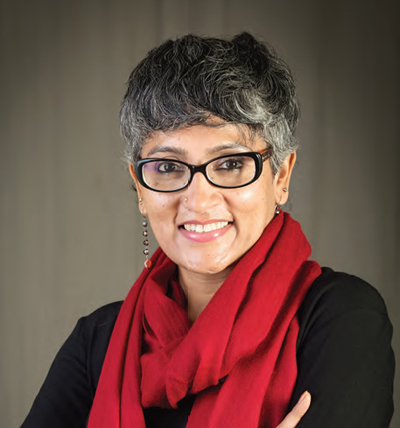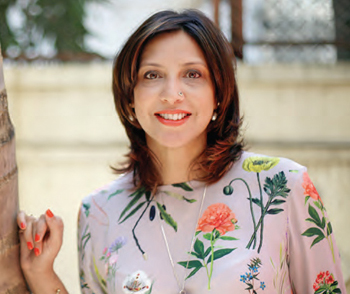The Future of Luxury in India

As part of Avid Learning’s Sustainability NOW Series, The Future of Luxury in India panel discussion explores the shifting notion and practice of luxury across the industries of fashion, lifestyle, branding, eco-tourism and hospitality. How are these sectors catering to a growing number of conscious consumers? How have they innovated to fit into a circular economy of production? Srimoyi Bhattacharya, Founder, Peepul Consulting; Shoba Mohan, Founder, RARE India; Vikram Ramchandani, Founder, Rewear and moderator, Gayatri Rangachari Shah, Journalist / Editor, Author, GRS Consultants discuss the topic
“The starting point is not design; the starting point is sustainability.”
- Stella McCartney, Leading Luxury Fashion Designer
The concept of luxury from the very root of the word’s etymology is linked to waste, excess and even immodesty. Can we, in today’s world, evolve the term and its attendant meanings to be seen as more than indulgence and extravagance? Can luxury be it in fashion, product design, heritage, beauty or hospitality-be repositioned and reimagined as a concept that is not only ethical and restrained but also one that is mindful of the environment and contributes actively to the healing of the planet?
As per a pre-Covid luxury market study from Bain and Company, a calculated sum of three trillion dollars’ worth of personal luxury goods was sold over the past 20 years. Much of these items go unused and hoarded, which has given rise to a nascent luxury rental market. Now more than ever, greater global sustainability needs to be the topmost focus for these industries.
"Luxury and sustainability have to go hand in hand as there is no vaccine for climate change. The good news is that not only are we more aware but many companies are taking steps to reduce waste and their carbon footprint"
- Gayatri Rangachari Shah, Journalist/Editor, Author, GRS Consultants

Gayatri Rangachari Shah: The term luxury was associated with something that was enormously rare and precious-nowadays, it is synonymous with conspicuous consumption and great waste. In fact, so ubiquitous is the term that luxury these days means enjoying an experience that “money can’t buy”. A pre-Covid luxury market study from Bain and Company calculated that three trillion dollars’ worth of personal luxury goods have been sold over the past 20 years. That’s a lot of material-in 2019 alone, 316 billion dollars of luxury goods was sold around the world. And while the pandemic saw luxury goods sales drop from around 20% globally, just recently, BoF reported that Gucci sales are back to pre-pandemic levels, Armani sales are up 34% in the first half of 2021. Who doesn’t remember images of ‘revenge shopping’ and the rush of people to stores, once lockdowns were eased across the world? I have no doubt that luxury goods sales will soar again. Pundits are describing the next few years as the ‘Roaring Twenties’, after all.
But, as we are all too aware, luxury and sustainability have to go hand in hand as there is no vaccine for climate change. The good news is that not only are we more aware but many companies are taking steps to reduce waste and their carbon footprint. We can thank millennials and the young for driving a lot of this change. The landscape for luxury is being re-imagined. Second-hand sellers, circular approaches and conversations around ethically sourced goods are getting increased visibility. Conscious tourism is growing in popularity. Whether it’s hotels that are environmentally conscious, buying shoes or clothes made from recycled materials or buying pre-owned or vintage, people are becoming more open to changing behaviours in order to support the environment.
Did you know that about a quarter of true luxury lovers buy second-hand products? And none of this was the case about a decade ago. After all, if consumers are comfortable buying second-hand cars and electronics, can clothes be the new frontier?
Let’s look at fashion. According to a recent report by BoF, the global second-hand fashion market is currently worth 130 billion dollars. And about 2.1 trillion of resaleable fashion inventory is lying around in closets across the world. In the US, companies like RealReal, Rebag and ReFlaunt have de-stigmatised the purchase of pre-loved fashion. In India, Rewear is doing the same thing. Vintage has become cool. Also, in India, digital penetration has increased which has spread the ability to buy pre-loved fashion. An article earlier this year in The Hindu states that more than 60 Instagram handles are focussed on thrifting. The US is leading the way in developing alternatives to materials like leather, which has a very high carbon footprint. It’s quite fascinating how plant-based materials are being developed by companies to imagine a more sustainable future. In travel and hospitality, something we long for post-pandemic, things are also changing. Eco-tourism is projected to grow from 181 billion dollars in 2019 to 333 billion dollars in the next 20 years. And we can all play a part in becoming more environmentally friendly travellers.
We have with us today a very exciting group of practitioners and experts from the Indian luxury space who are aligning luxury with sustainability. Whether it’s in fashion, branding or hospitality, they are changing the way we think about luxury and sustainability, and are trying to marry the two.
Srimoyi Bhattacharya: I run along with my partners Shakeel, Deepika and Noor-Peepul Consulting. We are a PR and marketing advisory specialised in luxury and lifestyle.
Vikram Ramchandani: I run a company called United Coalition of which Rewear is a part, wherein, we buy and sell used Indian designer wear. With Rewear, the hope is that people understand and consider used garments through a better lens and through one where they realise that every product has an innate value.
Shoba Mohan: I am a founder-partner at RARE India, a community of small and medium hotels with their hearts set on sustainability, which is not just about reimagining plastic or garbage disposal or things like that but is a community that believes in conservation at a very grassroots level, that is also inclusive of the community and the traveller, believing that all of us have to participate if we want to look at travel as a sustainable model.
"By nature, our traditions, our philosophies revolve around sustainability-thrift, keeping clean, giving away are all part of our upbringing from the olden days"
- Shoba Mohan, Founder, RARE India
Q: What is luxury to you within the context of your work and how do you feel it is being reimagined to become more sustainable?

Shoba: From the time I started to work in this field around 20 years ago, luxury has moved several paces. The hardware of luxury is the changeable part, the software of luxury is what I am more interested in, which is why I’d rather call it style. The kind of luxury we aim for is more to do with subtlety, the throwbacks to previous eras, the time and space of things, the idea of being involved and engaged, of having people sit down and have conversations around a large table, exchange ideas… that is the kind of luxury we try and promote. Of course, the hardware, the service quality, all of that remains.
Vikram: Luxury for me, has always included time. In the context of my work, it’s time, effort and skill. The craftsmanship that is available within our country is wide and varied and it’s a shame that it isn’t admired, researched and understood as it should be. Luxury is in the knowledge of what takes this time, skill and effort, understanding that within our clothes, and then wearing it with that sense of pride and knowledge. The advantage with pre-owned or gently worn clothes today in India is that we have very intricate and ornate garments because of which they cannot be worn very often. The quality of second-hand goods that are part of the festive range of Indian wear is generally in excellent condition. You are thus able to buy something at a discounted value whilst carrying forward the heritage and craft of the craftsmen who’ve made it, as opposed to just letting it lie in a cupboard. Luxury in this sense is the ability to allow that craft to live, and understanding and taking the time to realise the time, skill and effort that went into creating it.
Srimoyi: The story is shifting from luxury being defined by international brands to home-grown brands. It’s about what has been precious in our history and in our legacy, and the fact that we are bringing it all back today, whether it’s Ayurvedic traditions to our rich heritage of craft. We are seeing that the consumer today understands that there is a price to pay for an environmentally-friendly, welfare-conscious brand.
Q: In the hospitality sector, are consumers becoming more conscious in the type of choices they make?
Shoba: The whole conversation around sustainable travel actually got to a head in 2012–2014. Until then, everybody was talking about the experience being a new luxury. Even at that point in time, luxury in hotels was sold on the strength of big rooms, the view, nine-inch snoozer mattress, and blinds that can be operated through your phone. That was also the time awareness in the world started increasing about climate change across industries. Sustainability was still a side story till 2015 when it came up the centre. But did the industry or the traveller start to look at travel through the lens of sustainability? Not really, though children brought sustainability and environmental awareness home. In the pandemic, the industry has had time to listen to these conversations. The level of awareness has increased. Are travellers checking different aspects of sustainability before taking a trip? Not really, in the Indian context. However, because safety, smallness and remoteness have become important, and it rolls into the whole sustainability idea, you see an increased interest in hotels such as the RARE Hotels. However, India is a large travelling and not very evolved population, and change takes a lot of time. Also, sustainable hotels are not cheap hotels.
"Luxury is in the knowledge of what takes this time, skill and effort, understanding that within our clothes, and then wearing it with that sense of pride and knowledge"
- Vikram Ramchandani, Founder, Rewear
Q: How have consumers responded to Rewear, which is a pioneer in pre-loved or gently worn clothing? Have you seen an uptick or is it a struggle?

Vikram: Our country and culture is very different from what we read about in the West. Even within India, which almost works as a continent because the culture is so different in the North vis à vis the South, it has been a very sharp learning curve for us. Consumers have been receptive but I don’t think the trigger has had anything to do with their being conscious of their consumption-it’s because the products are cheap. There is a very little overlap between those that consign their garments with us and those that purchase. The ones that end up purchasing are looking for the cheapest possible deal, and it’s an alternative in some way to buying a knockoff of a Sabyasachi. The consigners are not particularly doing it for the money, they are doing it to make space in their closets and because on account of our system, they could give away some clothes and get something that’s new. Nonetheless, as long as transactions are happening and people are starting to be comfortable with this mode of consumption, it’s better overall. We are still navigating and understanding the nuances of the Indian market, and learning as we go.
"What we are seeing is that the consumer is interested in brands that are evocative in some way or touch a chord in some perspective. It could be about revival, connecting back to your tradition or the message of mindful consumption"
- Srimoyi Bhattacharya, Founder, Peepul Consulting

Q: You represent some major clients in the fashion space. How can brands encourage timelessness? What kind of trends are you seeing with regards to sustainable fashion? It’s a bit of a conundrum-you have to sell more and keep producing but at the same time, we are getting these signals that we should not be consuming so much…
Srimoyi: As a shopper myself, we don’t try to justify the consumption, it has to be ingrained in us. What we are seeing is that the consumer is interested in brands that are evocative in some way or touch a chord in some perspective. It could be about revival, connecting back to your tradition or the message of mindful consumption.
Q: Do you feel we need to consume less? How do we reconcile that with the need to grow and develop the economy, to give the craftspeople more work, to ensure the hospitality industry continues to thrive and grow because it is a major employer. How do we marry these fundamental dichotomies pulling in two different directions?
Vikram: Consumption needs to be thought about, it needs to be slightly more conscious. We have more than we need, in general. And there is more out there than we would ever require.
Today, there are no barriers to set up a business. There are lots of brands for almost anything. As consumers, we need to first question what it is that we want, if it is a product, if it’s something we truly enjoy, and if we can take care of it over time, however small it may be, whether it’s a small eraser or a motor vehicle. I think that’s a good way to start and it’s something we have been trying to practice as a family as well. It’s not easy but over time we feel less burdened, we feel less weight on our shoulders with fewer ‘things’.
Srimoyi: It’s very important at this stage to support young businesses, and while we talk about sustainability, it goes with the spirit of sustainability to be supportive of sustaining young labels. Everyone has worked hard to make business far more personal, and I see a lot of value in that. One of the shifts that has happened in the pandemic is that a hand-written note, a personal call, a little card to personalise a product or a gift has made a huge difference.
Shoba: It’s something I struggle with. With travel, for instance, you do burn fossil fuels to go anywhere. But do the ill-effects of travel balance the development attributes, the transformational and mindful engagement? In the pandemic, we are concentrating on the domestic market. There was a time when over 80% of our hotels were only interested in the inbound market. It’s a more sustaining, all-year-round market. Personally, I still think we consume a lot. I say, if you break up my house you could make four houses of it-there is just too much stuff that we have. On the other side, we are just too many people-we are three times the number we were 60-70 years ago.
We personally define what is enough for us. I believe the whole sustainability bit is very simple-it’s awareness; once you are aware and believe that each one of us can make a difference and make a change, I don’t think you can ever make wrong choices. It’s always a progression to the next level. In the last two years, I have bought nothing at all. I have an 80-year-old friend who says, “If I can’t eat it, drink it or read it, I don’t want it at all.” It has become a mantra to me as well. By nature, our traditions, our philosophies revolve around sustainability-thrift, keeping clean, giving away are all part of our upbringing from the olden days.